#1994 nick menza
Text

Annihilator - Alice in Hell 17/04/1989
ALICE IN HELL (1989) Facts - read til the end for surprise!):
- ANNIHILATOR: ALICE IN HELL was the 1st Gold Record for Roadrunner Records & the band.
- All songs written between 1984-1987 in Ottawa, Canada.
- All songs from "ALICE" (as well as most songs/riffs from 1990's "NEVER, NEVERLAND") were demoed via 3 cassette demos:
1) 1985 WELCOME TO YOUR DEATH (crystal ann, wtyd, lust of death-turned-human insecticide, buzzsaw blade, i am in command, back to the crypt)
Freed From The Pit (Road To Ruin)
2) 1986 PHANTASMAGORIA (alison hell, gallery-turned neverland and stonewall, phantasmagoria, ligeia)
Mayhem (Reduced to Ash) and I Love The Dead (Kraf Dinner) were demoed in the same session but didn't get on the officially-released version)
3) 1987 "SHOPPING DEMO" (wicked mystic, imperilled eyes, word salad). For record labels only.
- The WTYD demo 85 was reviewed around the world, while the Phantasmagoria demo 86 landed in the Top 4 circulated cassette demos in Metal music. Tape trading/dubbing was big then!
- While Jeff Waters wrote all the drums, Paul Malek played on most of the song demos; Jeff Waters played drums on 3 songs.
- Jeff Waters moved to Vancouver, Aug 1987 and started recording the record, off and on, from late 87-88.
- Studio engineer Paul Blake not only worked on ANNIHILATOR's records 1, 3, 4, 5, and 6, he also taught Jeff basic recording techniques and helped equip the 1st Watersound Studios on Maple Ridge, BC in 1994.
- AIH is cited as an influence by members of bands like Opeth, COB, In Flames, Slipknot, Trivium, Lamb Of God to Nickelback and Three Doors Down (Crystal Ann/Here Without You); and many more.
- David Ellefson (and Nick Menza) stated that: "The Rust In Peace lineup would crank up the ALICE IN HELL cassette everyday, to and from our writing and recording sessions for (their classic) the Rust In Peace record."
- Waters guitar playing on this record is said to be a major influence on the Scandinavian metal scene
- The next record, NEVER, NEVERLAND, surpassed ALICE in sales.
14 notes
·
View notes
Text
MEGADETH: 29 years of «Youthanasia»
On November 1, 1994, MEGADETH released the successor to the huge «Countdown To Extinction».
Originally released on November 1, 1994, via Capitol Records, «Youthanasia» celebrates its 29th anniversary today. This, which was MEGADETH's sixth studio album, followed the stratospheric success of the previous «Countdown To Extinction» and began recording at Phase Four Studios, in Tempe, in January 1994. After a few weeks of work, the musicians They then moved to Vintage Recorders, in Phoenix, Arizona, and it was in this second location that they did much of the work heard on the album.
The songs were produced by Max Norman, in partnership with Dave Mustaine, the group's leader, founder, vocalist, guitarist and main composer. Even without presenting a major stylistic change in relation to the band's previous recordings, this would only happen a few years later, with «Risk», «Youthanasia» showed the quartet firing on all cylinders and with what is considered their formation ideal: Dave Mustaine on guitar and vocals, Marty Friedman on guitar, David Ellefson on bass and Nick Menza on drums.
Adopting an approach that was perhaps just a little more accessible and rounded, this collection of twelve songs proved to be yet another huge commercial success for MEGADETH. Some would say... - even though he had never been in a position to bite even the most METALLICA heels, by now, Dave Mustaine must have felt a little more vindicated in relation to his former companions James and Lars.
Much at the expense of the echoes caused by «Symphony Of Destruction» and the enormous impact caused by the predecessor «Countdown To Extinction», which had been released just two years before, «Youthanasia» stoically supported itself on two more hugely successful singles , the heaviest «Train Of Consequences» and the super ballad «A Tout Le Monde», which quickly became a huge radio success and one of the most unmissable moments in the group's career.
instagram
0 notes
Photo

Sabías que, el 23 de julio de 1964 nació en Munich (Alemania) el baterista estadounidense Nick Menza, (hijo del músico de jazz Don Menza) conocido por su trabajo en la banda Megadeth entre 1989 y 1998. Participó en cuatro de sus álbumes, ‘Rust in Peace’ en 1990, ‘Countdown to Extinction’ en 1992, ‘Youthanasia’ en 1994 y ‘Cryptic Writings’ en 1997. Posteriormente tocó y/o grabó con Marty Fiedman, Menza, Chodle's Trunk y Fear Assembly y desde 2005 hasta su muerte a los 51 años de un fallo cardíaco en mayo 2016, fue miembro de Memorain, Orphaned to Hatred, Deltanaut y OHM. (1964-2016) @relaxvideobar www.relaxvideobar.com (at RELAX VIDEO BAR) https://www.instagram.com/p/CgYvN3VOxaL/?igshid=NGJjMDIxMWI=
0 notes
Text

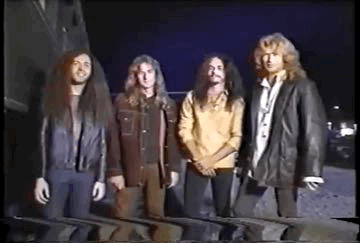

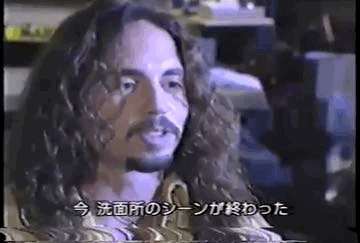
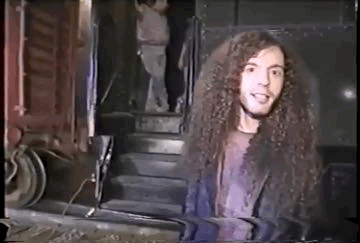
Behind the scenes of the Train of Consequences music video.
#dave mustaine#nick menza#marty friedman#my gifs#megadeth#1994 dave mustaine#1994 nick menza#1994 marty friedman
39 notes
·
View notes
Photo


the making of youthanasia (1994)
110 notes
·
View notes
Audio
𝔐𝔢𝔤𝔞𝔡𝔢𝔱𝔥 - 𝔗𝔯𝔞𝔦𝔫 𝔬𝔣 ℭ𝔬𝔫𝔰𝔢𝔮𝔲𝔢𝔫𝔠𝔢𝔰
#Megadeth#Youthanasia#Train of Consequences#Release date: November 1st 1994#Genre: Speed/Thrash Metal./ Heavy#Lyrical themes: Politics War History Death Religion Society New World Order#USA#Nick Menza era#Marty Friedman era
141 notes
·
View notes
Photo


Remember to stay hydrated
#Megadeth#Dave Mustiane#Nick Menza#Youthanasia#Youthanasia era#heavy metal#thrash metal#bands#live concert#1994#90s#mypost#I really don't know if these gifs already exists ?#saw this concert the other day and felt this was necessary#the fact that my blog is named after nick and never did a proper post about him besides when he died hAh kms#also guess what day it is today :))))))))))))))))#anyways stay hydrated
47 notes
·
View notes
Photo
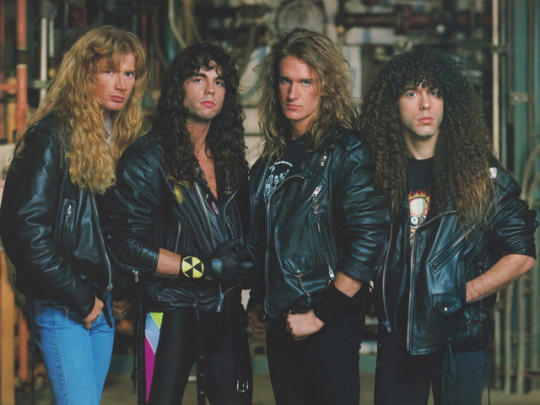
Megadeth, 1994
#megadeth#dave mustaine#david ellefson#marty friedman#nick menza#rust in peace#countdown to extinction#youthanasia#cryptic writings#1994#1990s#90s#metal#thrash metal#heavy metal#vic rattlehead#Rip Magazine
325 notes
·
View notes
Photo
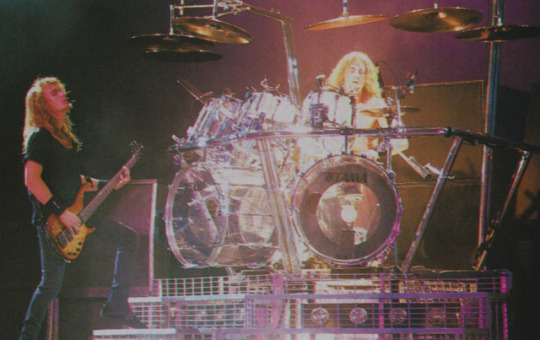
Megadeth
Ellefson & Menza
Youthanasia Era 1994
#megadeth#david ellefson#nick menza#youthanasia#1994#1990#rock#metal#dave mustaine#metallica#show#drums#bass
36 notes
·
View notes
Audio
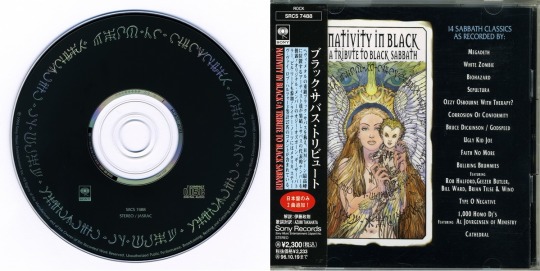
Megadeth - Paranoid (1994)
Ozzy Osbourne / Geezer Butler / Tony Iommi / Bill Ward
from: "Nativity in Black:
A Tribute to Black Sabbath"
Thrash Metal | Heavy Metal | Speed Metal
JukehostUK
(left click = play)
(320kbps)
Personnel:
Dave Mustaine: Lead Vocals / Guitar
Marty Friedman: Lead Guitar
David Ellefson: Bass / Backing Vocals
Nick Menza: Drums
Produced and Mixed by Max Norman
4 notes
·
View notes
Text
Megadeth

Based around founder and only original member Dave Mustaine, Megadeth has, over it's 20+ year career, carved out a place for itself as one of the original and longest lived proponents of the thrash-metal genre. Though the band has battled with member's substance abuse problems and an almost revolving door membership, the group had repeatedly racked up enormous record sales and has toured successfully throughout their career.
Guitarist and singer Dave Mustaine was born on September 13th, in La Mesa, California. He grew up in a broken home, and he and his mother and sisters moved quite frequently to stay away from his abusive father. By the age of 17, Mustaine was supporting himself by selling drugs, and rented his own apartment. One of his customers worked at a record store, and when short of cash to pay for drugs, started trading Mustaine albums by heavy metal bands like Judas Priest and Iron Maiden. Soon Mustaine took the albums as inspiration, and taught himself how to play guitar. After joining a band called Panic for a short time, Mustaine answered an ad in a local newspaper for a band looking for a lead guitarist. That band turned out to be Metallica, and Mustaine would serve as the band's lead guitarist for less than two years. Mustaine served in the band when they were perfecting the cross-pollination of hardcore punk and metal often called thrash-metal or speed-metal, and by the time Mustaine was kicked out of the band for his behavior and substance abuse, Metallica was building up a sizable following of fans. After Mustaine was fired from Metallica, he swore to build up a new band that would be heavier and faster than Metallica, and just two months after his dismissal, formed Megadeth with bassist Dave Ellefson, drummer Dijon Carruthers and guitarist Greg Handevidt. Initially the band looked for a vocalist, but after many auditions, Mustaine decided that he could sing, as well as serve as the band's co-lead guitarist, (Megadeth has always had a history of two guitarists who can trade off lead and rhythm duties), main songwriter and main lyricist. The sound of Megadeth was indeed heavier and speedier than even Metallica, and stripped away some of the progressive rock influences that Metallica flirted with in some of their songs to a more straight-forward style of thrash.
After playing gigs in the fertile Southern California metal scene and undergoing the first of many personnel changes, by 1984 Megadeth were ready to record a demo of some of their songs. With Mustaine, Ellefson and drummer Lee Rausch, the group recorded a three song demo, which brought them to the attention of the New York-based metal label Combat Records, and the group signed with label soon after. Guitarist Kerry King filled in as the second guitarist for a short time, but left to concentrate on his primary band, Slayer. Rausch was also replaced by drummer Gar Samuelson, who came from a background of playing in jazz-fusion bands, and after King quit the band, Samuelson brought in his friend, guitarist Chris Poland, who had played with Samuelson in the fusion scene. Now with a technically gifted line-up and a recording deal, the band was ready to record it's first album. Unfortunately, the band also had a huge appetite for drugs and alcohol, and spent over half of the budget they had been given to record the album on their recreational habits. Because of this, they had to fire their original producer, and ended up producing the album themselves. Killing Is My Business...and Business Is Good! (Combat) was released in 1985, and even though the production wasn't all it could have been, it established the band as a new force in metal, and definite contenders for the crown of the heaviest and fastest bands along with Metallica and Slayer. The album artwork also introduced the band mascot, Vic Rattlehead, whose skeletal head is covered with a riveted-on visor, a clamp for his mouth and metal caps for his ears, embodying the phrase “See no evil, hear no evil, speak no evil”. Initial copies of the album included a speed-metal version of Nancy Sinatra's classic 60's era hit “These Boots Are Made For Walking”, but after 1995, because of a suit filed by the song's author, Lee Hazlewood, the song was pulled from all further pressings of the album. The group toured in support of the album through North America, and when guitarist Poland left the band abruptly in the middle of the tour, his place was taken by Mike Albert. Once back from the tour, Poland rejoined the band. The group started work on a new album, but with Combat's limited recording budget, the group were unhappy with the results they could get, and so went looking for a major label deal. They signed to Capitol Records soon after, and got a new producer to come in and remix the material they had already recorded. The result was the album Peace Sells...But Who's Buying? (Capitol), released at the end of 1986. Peace Sells... was both a commercial and critical success, and went on to sell more than a million copies in just the U.S. It has been hailed in years since as one of the most influential metal albums of the 1980's. After release of the album, Megadeth toured supporting Alice Cooper, and then headlined their own tour in both North America and Europe. At the conclusion of the touring in support of Peace Sells..., both Samuelson and Poland were sacked from the band, reportedly due to excessive substance abuse. Samuelson was replaced by drummer Chuck Behler, and Poland was at first replaced by Malice guitarist Jay Reynolds, but as the band got to work on their next album, Reynolds was replaced by guitarist Jeff Young, who had actually been one of Reynold's guitar teachers.
With a new line-up of the band in place, the group spent the next few months recording, but substance abuse problems plagued the sessions, this time mostly due to Mustaine's heroin addiction. The producer the band had used for Peace Sells..., Paul Lani, was originally tapped for the new album, but after a falling out with Mustaine, the group retained producer Michael Wagner to finish the sessions. Megadeth released So Far, So Good....So What! (Capitol) in January of 1988, and though the album went platinum in the U.S., it was widely panned by both critics and some fans of the band as sounding forced and not as genuine as their earlier albums had. The album also featured a cover version of the Sex Pistols' “Anarchy In The U.K.”, which featured lyrics unintentionally altered by Mustaine because he had heard the original lyrics wrong and never bothered to check what the original lyrics were. The group appeared in the 1988 Penelope Spheeris documentary The Decline of Western Civilization II: The Metal Years as an antidote to many of the “hair-metal” bands that populated Southern California in that period of time. Megadeth also toured around the world with such bands as Dio and Iron Maiden, and appeared at the Monsters of Rock festival at Castle Donnington in the United Kingdom. At the conclusion of the tour, Mustaine fired both Behler and Young from the band. Drummer Nick Menza was drafted as the group's new drummer, and the group continued as a three-piece for a short period of time, until Mustaine was arrested in the summer of 1989 for driving while intoxicated and possession of narcotics. Soon after, Mustaine was ordered into rehab, and emerged sober for the first time in over ten years.
With Mustaine sober, the group continued looking for another guitarist, and spent time auditioning many prospective members, but eventually settled on ex-Cacophony guitarist Marty Friedman. With the entire band being sober for the first time in the studio, the proceedings were far more streamlined and focused, and the band delivered Rust In Peace (Capitol) in September of 1990 to a chorus of approval from both critics and the band's fans. Rust In Peace went on to sell over a million copies, and was nominated in both 1991 and 1992 for Grammys for Best Metal Performance. In 1990, Megadeth joined with Slayer, Testament and Suicidal Tendencies for the European leg of the Clash of the Titans tour, and followed that up with appearances at Rock In Rio in Brazil and the American version of Clash of the Titans with Slayer, Anthrax and Alice In Chains. From there, the group started work on a new album, Countdown To Extinction (Capitol), which was released in 1992. Co-producer Max Norman, who had also worked with the band on their previous album, pushed the group to write more radio-friendly songs, and actively encouraged songwriting contributions from the other members of the band besides Mustaine. Countdown To Extinction debuted at #2 on the U.S. album charts, and went on to earn double-platinum status in sales and was nominated for a Grammy for Best Metal Performance. The group again toured the world in support of the album, with such bands as Pantera, Suicidal Tendencies and Stone Temple Pilots, though the last leg of their North American tour had to be canceled because Mustaine had lapsed again into substance abuse. After a seven week program, Mustaine was clean again, and the band returned to the stage again in June of 1993 when they appeared as special guests at a Metallica concert in the U.K., thus effectively healing the riff that had existed between Mustaine and his former bandmates.
With three of the band members now living in Arizona, Megadeth decided to record their next record there, but after problems arose with the original studio the band had selected, they decided, with co-producer Max Norman, to build their own studio inside of a warehouse in Phoenix. For the first time in their career, the group wrote and recorded a whole album together inside of a studio. The result, the album Youthanasia (Capitol), was released in late 1994, and continued the band's drift towards a more radio-friendly sound. Youthanasia was another huge success, and it earned Megadeth another platinum selling album. The group embarked on an almost year-long worldwide tour in support of the album, and also contributed a cover version of the song “Paranoid” to the compilation Nativity In Black, the first tribute album to metal godfathers Black Sabbath. Due to fan demand, the group released an EP of all of their songs that had appeared on soundtracks and compilation albums, called Hidden Treasures (Capitol) in July of 1995. Following their touring obligations, Megadeth took time off, during which time Mustaine worked on his side project MD.45 with Lee Ving, the singer of punk band Fear. Once the band resumed in 1996, it was decided they would go in an even more commercial direction, and worked with new producer/manager Bud Prager in Nashville to that end. The resulting album, Cryptic Writings (Capitol), was released in June of 1997. Though it received mixed reviews from critics, it was another success for the band, and was the group's sixth consecutive album to go gold in the United States. The group returned to the road in support of the album, but halfway through the duration of the tour, drummer Nick Menza discovered he had a tumor on his knee, and had to leave the tour and be operated on. The group at first replaced him with temporary drummer Jimmy DeGrasso, but decided later to keep DeGrasso as Menza's full-time replacement. With the success of Cryptic Writings, Mustaine ceded more control of the band's sound over to Prager and co-producer Dann Huff, and the two brought in elements of electronica and more pop influences, almost to the exclusion of any metal. Once the album, Risk (Capitol) was released in 1999, it bombed both commercially and critically. The group toured in support of the album, but three months into the tour, guitarist Friedman quit the band, citing musical differences, and was replaced by guitarist Al Pitrelli, formerly of Savatage and Alice Cooper. The group started to record another album, this time a return to their thrash-metal sound, in 2000, but in the middle of recording, got an offer to tour with Anthrax and Motley Crue. Soon after the tour, the band found out that Capitol would be dropping them from their roster, and instead of issuing the new album by the band, issued a greatest hits record with the unfortunate title Capitol Punishment: The Megadeth Years (Capitol)(2000). Though the album was a good-bye from Capitol, it did include two new songs, “Dread And The Fugitive Mind” and “Kill The King”, which showed the band returning to their metal roots.
Megadeth signed with Sanctuary Records in 2000, and returned to the studio to finish up the album they had begun when signed to Capitol. The World Needs A Hero (Sanctuary) was released in 2001, and while it didn't get great reviews from many critics, it did give the band's old fans new hope that they had returned to their metal roots. Megadeth launched another tour in support of the album, but the tour was cut short following the attacks of September 11th, 2001 on New York City. The group had planned to record a live CD and DVD in Argentina while on tour, but instead recorded two shows in Arizona, which were released on the live CD and DVD Rude Awakening (Sanctuary). Mustaine also took time out in 2002 to work on remixing and remastering the band's first album to bring it up to the quality of modern metal albums. In early 2002, Mustaine was admitted to the hospital to remove a kidney stone, and while there, back under the influence of opiates, he suffered a relapse. Upon his release, Mustaine immediately checked himself into a rehabilitation facility, and while there suffered a freak nerve injury, called radial neuropathy, which caused him to not be able to grasp anything with his left fist. Faced with not being able to play guitar again, Mustaine announced that Megadeth was disbanding. To fulfill contract obligations, Sanctuary released the compilation album Still Alive...And Well? in 2002. After almost a year of intensive therapy, Mustaine was able to teach himself how to play guitar again, and started work on sessions for a solo album with session musicians drummer Vinnie Colaiuta and bassist Jimmy Sloas, but Mustaine put the project on hold when he was asked to remix and remaster Megadeth's back catalog by Capitol, re-recording some parts that had been lost and replacing some parts that he hadn't liked in the initial recording sessions. In 2004, Mustaine returned to his solo recordings, but due to some contractual obligations, he learned that he needed to deliver another album under the Megadeth name. Mustaine decided to see if he could reform the Rust In Peace-era line-up of the band, and while drummer Nick Menza was onboard, bassist Dave Ellefson and guitarist Marty Friedman couldn't come to an acceptable financial agreement with Mustaine. Instead, Mustaine contacted former lead guitarist Chris Poland, who agreed to play on a new album, but wouldn't be interested in touring and remaining in the band. Megadeth released their “comeback” album The System Has Failed (Sanctuary) in 2004, to positive reviews from both critics and the band's longtime fans. At the beginning of the tour, Mustaine announced that this would be Megadeth's last tour, and he would pursue a solo career after the tour's end. Enlisting bassist James MacDonough from Iced Earth and guitarist Glen Drover from Canadian metal band Eidolon, the band started rehearsals for the tour, but just a few days into it, it became apparent that Menza would not be able to physically play the duration of the tour, so Drover contacted his brother Shawn Drover, the drummer in Eidolon, and the Drover brothers and MacDonough completed the touring line-up of Megadeth. With The System Has Failed and the tour being such a success, Mustaine had a change of heart about the future of the band, and decided he would carry on. The last night of the 2005 Blackmail The Universe tour, performed in Buenos Aires, Argentina, was filmed and released as a DVD and CD in 2007 under the title That One Night: Live In Buenos Aires (Image). Bassist MacDonough left Megadeth in early 2006, and was replaced by former Black Label Society and White Lion bassist James Lomenzo. The new line-up of Mustaine, Drover, Drover and Lomenzo recorded Megadeth's eleventh studio album United Abominations (Roadrunner), released in May of 2007, and saw the album debut at #8 in the U.S., the highest chart position the band had enjoyed since 1994. The group toured in support of the album with Heaven and Hell, (the reformed Dio-era Black Sabbath), and also embarked on their own Tour Of Duty tour which took them across North America and into Asia and Australia. In early 2008, guitarist Glen Drover announced he was leaving the band, and was replaced by guitarist Chris Broderick, formerly of Jag Panzer and Nevermore. In 2009 the band released Endgame, followed by Thirteen in 2011, Super Collider in 2013, and Dystopia in 2016. Former drummer Nick Menza died May 21, 2016. he was 51 years old.
Source
Read the full article
0 notes
Text
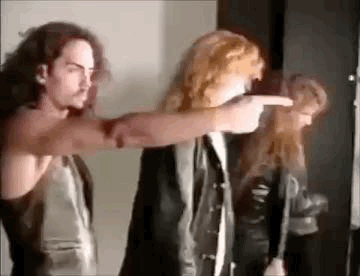
Megadeth Evolver: The Making Of Youthanasia
hi i miss nick so much so here’s a little gif i made from the making of youth :(
15 notes
·
View notes
Photo
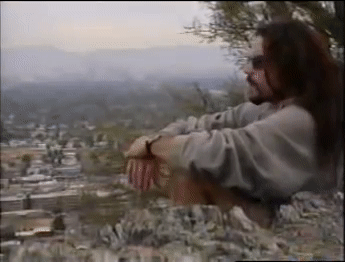

nick menza in the making of youthanasia (1994)
#megadeth#nick menza#my gifs#youthanasia#the making of youthanasia 1994#i was gonna write captions but decided against it so for context for the second gif hes just saying the sky looks cool
37 notes
·
View notes
Audio
Megadeth - Addicted to Chaos
#Megadeth#Youthanasia#Addicted to Chaos#Release date: November 1st 1994#Genre: Speed/Thrash Metal ./ Heavy#Lyrical themes: Politics War History Death Religion Society New World Order#USA#Nick Menza era#Marty Friedman era
104 notes
·
View notes
Photo

On this day in 1995, Megadeth release the EP 'Hidden Treasures’. The album features songs that first appeared on movie soundtracks and tribute albums. Four of the tracks were released as singles, and three have received Grammy Award nominations for Best Metal Performance. Hidden Treasures is a rarities compilation that features songs that Megadeth had recorded for a number of projects, but had not released on one of the band's studio albums. Most of these were contributions to film soundtracks. In 1989, Megadeth recorded a version of Alice Cooper's "No More Mr. Nice Guy" for the soundtrack to the Wes Craven-directed horror film Shocker. It marks drummer Nick Menza's recording debut with the band. The recording was released as a single and peaked at number 13 on the UK Singles Chart in 1990. "Go to Hell" appeared on the Bill and Ted's Bogus Journey soundtrack in 1991. The song features the same prayer, "Now I Lay Me Down to Sleep", used in "Enter Sandman" by Metallica, and can be heard at the beginning of the track. The band contributed three songs to soundtracks in 1993. "Angry Again", recorded during the sessions for Countdown to Extinction, appeared on the soundtrack to Last Action Hero and received a nomination for "Best Metal Performance" at the 1993 Grammy Awards. The song has appeared on several of the band's compilations. "Breakpoint" appeared on the soundtrack for the Super Mario Bros. film. "99 Ways to Die" was recorded for the soundtrack to The Beavis and Butt-head Experience and released as a single and a music video. It was nominated in the "Best Metal Performance" category at the 1995 Grammy Awards. "Diadems" was released on the Demon Night soundtrack in 1995. In addition to soundtrack contributions, the band submitted a cover of Black Sabbath's "Paranoid" for the tribute album Nativity in Black in 1994. It was nominated for "Best Metal Performance" at the 1996 Grammy Awards. "Problems" is a Sex Pistols cover and was previously unreleased. (at Dash Radio) https://www.instagram.com/p/B0Ea4zspN0d/?igshid=fhvoftxdropb
0 notes
Text
REVISIT: MEGADETH COMPOSED CRYPTIC WRITINGS THIS DAY IN 1997
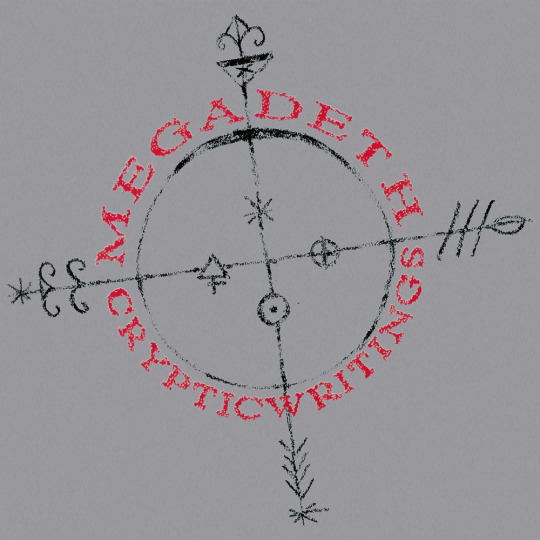
Los Angeles thrash metal band, Megadeth, released their seventh album, Cryptic Writings, which first came out today (June 17) in 1997, released via label, Capitol.
Cryptic Writings debuted at #10 on US Billboard charts, certified Platinum in 1998.

The first 500,000 copies of Cryptic Writings in the US were released with silver background album cover. The 2004 remixed and remastered re-release with a black background.
It was the band’s last studio album to feature drummer, Nick Menza, who left after reportedly discovering a tumour in his knee. His departure would mark the end of the band’s longest lasting line up to date, having recorded a whole four studio albums: Rust In Peace (1990), Countdown To Extinction (1992), Youthanasia (1994) and, of course, 1997’s Cryptic Writings.
This album had accessible song structures, specifically aimed for radio airplay. The lyrics were also altered, in order to make the music span wider audience, too. New manager closely supervising at the time, Bud Prager, had musical and lyrical ideas changed at his request.
Frontman, David Mustaine, later wrote, “I figured maybe this guy [Prager] could help me get that intangible number one record I so badly wanted.”
Mustaine also said that Cryptic Writings was divided into thirds. One part was based around faster, more aggressive material, another was “…radio-orientated music like Youthanasia” and the final third was more melodic.
Indeed, Countdown To Extinction, Youthanasia and slightly less so Cryptic Writings all had strong sales and significant radio play. Guitarist, Marty Friedman, said of the latter that the songs came together naturally because the band wasn’t rushed to get a record out.
Max Norman, the producer of Youthanasia, had his collaboration with Megadeth aborted this time round because, according to Mustaine, “Max came up with this bullsh*t formula that every song had to be 120 beats per minute to get on the radio. When people make drastic decisions to do things like that and it backfires, it usually ends up, in one way or another, costing them their jobs.”
Album opener, “Trust”, was nominated for a Best Metal Performance Grammy in 1997.
Singles for this album were “Trust”, “Almost Honest”, “Use The Man” and “A Secret Place”.
youtube
You’re told to “Trust” to begin with. This with booming, almost tribal drum and dark, almost harmonic jazzy bass brooding moodily. It then gets a bit more sinister, a bit more metal. Then the guitar waves in before ripping in, crushing. “Lost in a dream/Nothing is what it seems” Mustaine on edge, as ever. An acoustic section ushers in a change of mind, dainty and delicate before electric once again makes its rage known. Solo wailing passionate. “God help me, please/On my knees” a sign of the desperation unfolding.
youtube
“Almost Honest” is driving and kickass. The bass really harnessing the power of the groove. The chorus is weirdly shimmering and somewhat optimistic. “Living alone, falling from grace/I want to atone but there’s just empty space” summing all that up. Guitar suitably gnarly as the driving groove perpetuates. Vocal harmony towards, “…almost”, gives a bit more melody.
“Use The Man” doesn’t mess about. The ensuing sample (“Needles And Pins” by The Searchers) very deceptive, cuing something melodramatic and destroyed. “I’ve seen the man use the needle, seen the needle use the man” with, “Just one shot to say goodbye” telling you, perhaps, Mustaine’s problems with heroin addiction. “He hung his head inside the noose,” getting yet more graphic. The speed ramps up to a crazy degree, solo so wild and intense. Both triumphant and tragic.
There’s then the machinations of the “Mastermind”. Bass, after a flash of guitar chord, comes cyclical and intimidating. Like the soundtrack to a mastermind that knows your every move. Then thrashy intrigue comes midway, quickly followed by a tense, terse guitar solo.
Following track, “The Disintegrators”, has the energy for which the band had become known for. Machine gun fire guitar and hammering drum.
Then “I’ll Get Even” is like a sequel to the opener, guitars in a supporting role to jazzy, almost harmonic bass. Then drum regiments this to something more syncopated. Guitar breaks free of this reverie, no longer constrained. “I’ve haven’t slept in days” helps you surmise the bent of the track, the sleepless seeking revenge.
“Sin” has that emphatic hit of the drum, bluesy guitar workout kind of feel. Hauling ass on a monster truck. Guitar scratchy and abrasive, wheels spinning in the dry dirt and burning rubber doughnuts.
youtube
“A Secret Place”, now. This fades in ominously, Middle Eastern guitar playing a melody as if trudging through never ending sand and desert. “Welcome to my hideaway, my secret place” like where to recuperate when shot to bits. The problem, seemingly, “If you get inside, you can’t get out”. More harm than good? Swaggering guitar gives way to that certain Middle Eastern flavour, bass and drum as one, syncopating with a knowing sneer.
Then the exploratory “Have Cool, Will Travel” clamours for the top, the way people would be clamouring for a ladder out of a hellhole that can only take once person’s weight. It turns quite mellow, sparse before chugging back into the metal proper, again.
Femme fatal comes in the form of the “She-Wolf”. The speed of the opening guitar almost galloping, bass then embellishing this fleet of picking instrumentation. Seeming twin guitar brings a certain majesty to the track, especially towards its raucous end.
“Vortex” hits immediately before awesome, conspiring guitar takes hold. An early midsection offers a breakdown sort of groove, cyclical riff to slam to. Then spiralling downwards into descending riffage, full of despair and sucked into the vortex.
The album closes embattled in “FFF”. This like an anvil hitting at pumping piston speed. “To take a lost life, lock it up, break it down; how much more can we take” a question suiting the musical mood so perfectly. Fight for freedom, apparently. The ending abrupt, ringing out into nothing. Annihilation?
All the tracks on Cryptic Writings worthy highlights are “Trust”, “Almost Honest”, “Use The Man”, “I’ll Get Even”, “A Secret Place”, “She-Wolf”, “Vortex” and “FFF”. This three quarters of it special. A good start, middle and ending, with only a small handful of tracks either side of the middle not as good. As it turns out, these tracks couldn’t have been better distributed throughout.
Megadeth, at this point, were almost at their deliberate commercial peak. There were still tracks to write home about, even when they went out their way to be seemingly less trash metal than before. This only going to prove the strength of the album even more so. Eight out of twelve isn’t too bad, these monumentally epic and shading the other four like the excellent versus the very good. Megadeth’s Cryptic Writings can be bought on iTunes, here.
#Megadeth#Rust In Peace#Countdown To Extinction#Youthanasia#Cryptic Writings#Nick Menza#Bud Prager#David Mustaine#Marty Friedman#Max Norman#Needles And Pins#The Searchers
0 notes